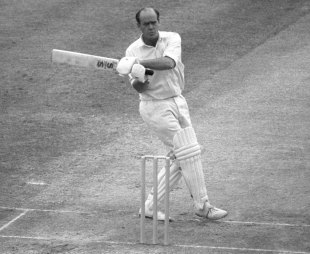It was a day for history at North Marine Road. Yorkshire, like the venerable Almanack, are celebrating their 150th anniversary this year. Sunday was also 50 years removed from the first of Geoffrey Boycott's 151 centuries in a Roses game at Bramall Lane, an occasion marked with the presentation of a framed scorecard. And then there was Matthew Fisher, all of 15 years and 212 days old, the youngest player to appear in a competitive county game since Charles Young, who turned out for Hampshire against Kent in 1867, aged 15 years and 131 days.
There is an inevitable melancholy about this great wash of time, refracted through the boys at either end of it. Young, a left-hand allrounder who was born in India, played 38 games across the next 18 years before slipping away into history. No one knows when or where he died, or the circumstances surrounding his end. He was here and then he was gone. We're left with his wickets and his runs and his odd little record, which may stand forever. Fisher is from an entirely different world and a more focused and intense game, yet prodigies always carry with them a chance of unfulfilment that can be unsettling.
Fifteen, you think, that's just too early, isn't it, however good you may be. For a start, it is such a brief span. Boycott had been retired for 11 years by the time Fisher was born, and no doubt Geoffrey could (and perhaps has) told the young man how fleeting those years can feel.
Yorkshire know a prodigy when they see one. Their 2nd XI keeper Barney Gibson was 15 years and 27 days old when he played against Durham University. Tim Bresnan got a Sunday League game as a 16-year-old. They had the young Sachin, of course, and before him Kevin Sharp, who seemed set for greatness after making a double-hundred for Young England and appearing in the first team at 18.
Then there was Brian Close, a man whose legend exists on different terms to those that his precocity seemed sure to dictate. Born in the same town, Rawdon, as Hedley Verity, he played Under-18 cricket at the age of 11, appeared for Leeds United and England youth as an amateur footballer and was considered bright enough to have attended Oxford or Cambridge had he chosen that path. Instead he became the youngest man ever to play for England in a Test match, in July 1949 at the age of 18, whilst in the process of completing the "double" of 1000 runs and 100 wickets in his first season (another record). Had the world known then that Close would make his final Test appearance almost 27 years later it might have imagined a new Leviathan had come, yet he played just 22 times for England.
In its place, Close's fame is based around his unyielding toughness, the brilliance of his captaincy (six wins and a draw in his seven Tests as England skipper; sacked after being accused of time-wasting in a game for Yorkshire) and his ability to nurture young players both in cricket and in life. Perhaps some of that understanding came from his earliest years, and the burden that they bestowed. He was by almost any measure a wonderful player, almost 35,000 runs, 1171 wickets and 800 catches batting left-handed and bowling right, and yet his first season casts its long shadow.
We are programmed to think that the earlier a talent emerges, the bigger it must be. That is not always the case. It will certainly not be rounded enough to offer anything other than promise, and promise is ephemeral stuff, available only for the briefest of moments. Matthew Fisher has promise, and our good wishes. What he needs most now is simply time.

No comments:
Post a Comment